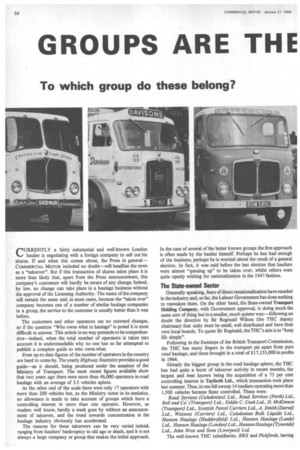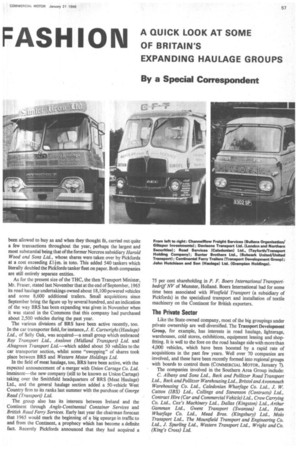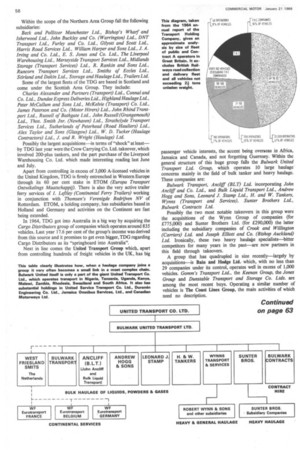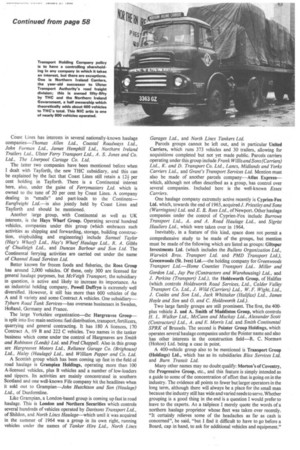GROUPS ARE THE FASHION
Page 58

Page 59

Page 60

Page 65

If you've noticed an error in this article please click here to report it so we can fix it.
A QUICK LOOK AT SOME OF BRITAIN'S EXPANDING HAULAGE GROUPS By a Special Correspondent
CURRENTLY a fairly substantial and well-known London haulier is negotiating with a foreign company to sell out his shares. If and when this comes about, the Press in general— COMMERCIAL MOTOR included no doubt—will headline the news as a "takeover". But if this transaction of shares takes place it is more than likely that, apart from the Press announcement, this company's customers will hardly be aware of any change. Indeed, by law, no change can take place in a haulage business without the approval of the Licensing Authority. The name of the company will remain the same and, in most cases, because the "taken over" company becomes one of a number of similar haulage companies in a group, the service to the customer is usually better than it was before.
The customers and other operators see no outward changes, so if the question "Who owns what in haulage" is posed it is most difficult to answer. This article in no way pretends to be comprehensive—indeed, when the total number of operators is taken into account it is understandable why no one has so far attempted to publish a complete guide to who owns what.
Even up-to-date figures of the number of operators in the country are hard to come by. The yearly Highway Statistics provides a good guide—as it should, being produced under the auspices of the Ministry of Transport. The most recent figures available show that two years ago there were more than 46,000 operators in road haulage with an average of 3.5 vehicles apiece.
At the other end of the scale there were only 17 operators with more than 200 vehicles but, as the Ministry notes in its statistics, no allowance is made to take account of groups which have a controlling interest in more than one operator. However, as readers well know, hardly a week goes by without an announcement of takeover, and the trend towards concentration in the haulage industry obviously has accelerated.
The reasons for these takeovers can be very varied indeed, ranging from hauliers' bankruptcy to old age or death, and it is not always a large company or group that makes the initial approach. In the case of several of the better known groups the first approach is often made by the haulier himself. Perhaps he has had enough of the business; perhaps he is worried about the result of a general election. In fact, it was said before the last election that hauliers were almost "queuing up" to be taken over, whilst others were quite openly wishing for nationalization in the 1947 fashion.
The State-owned Sector
Generally speaking, fears of direct renationalization have receded in the industry and, so far, the Labour Government has done nothing to reawaken them. On the other hand, the State-owned Transport Holding Company, with Government approval, is doing much the same sort of thing but in a smaller, much quieter way—following no doubt the directive by Sir Reginald Wilson (the THC deputy chairman) that units must be small, well distributed and have their own local boards. To quote Sir Reginald, the THC's aim is to "keep life simple".
Following in the footsteps of the British Transport Commission, the THC has many fingers in the transport pie apart from pure road haulage, and these brought in a total of £.17,155,000 in profits in 1964.
Already the biggest group in the road haulage sphere, the THC has had quite a burst of takeover activity in recent months, the largest and best known being the acquisition of a 75 per cent controlling interest in Tayforth Ltd., which transaction took place last summer. Thus, in one fell swoop 14 hauliers operating more than 1,500 vehicles became State controlled. These were: Road Services (Caledonian) Ltd., Road Services (Forth) Ltd., Bell and Co: (Transport) Ltd., Siddle C. Cook Ltd., D. McKinnon (Transport) Ltd., Scottish Parcel Carriers Ltd., A. Smith (Darvel) Ltd., Watsons (Carriers) Ltd., Caledonian Bulk Liquids Ltd., Hanson Haulage (Huddersfield) Ltd., Hanson Haulage (Leeds) Ltd., Hanson Haulage (London) Ltd., Hanson Haulage (Tyneside) Ltd., John West and Sons (Liverpool) Ltd.
The well-known THC subsidiaries, BRS and Pickfords, having been allowed to buy as and when they thought fit, carried out quite a few transactions throughout the year, perhaps the largest and most substantial being that of the former Norcros subsidiary Harold Wood and Sons Ltd., whose shares were taken over by Pickfords at a cost exceeding illm. in toto. This added 540 tankers which literally doubled the Pickfords tanker fleet on paper. Both companies are still entirely separate entities.
As for the present size of the THC, the then Transport Minister, Mr. Fraser, stated last November that at the end of September, 1965 its road haulage undertakings owned about 18,100 powered vehicles and some 8,600 additional trailers. Small acquisitions since September bring the figure up by several hundred, and an indication of the way BRS has been expanding was given in November when it was stated in the Commons that this company had purchased about 2,500 vehicles during the past year.
The various divisions of BRS have been active recently, too. In the car transporter field, for instance,./. E. Cartwright (Haulage) Ltd., of Selly Oak, was acquired—a small group which embraced Roy Transport Ltd., Anslows (Midland Transport) Ltd. and Alvagreen Transport Ltd.—which added about 50 vehicles to the car transporter section, whilst some "swopping" of shares took place between BRS and Western Motor Holdings Ltd.
In the field of meat haulage, too, BRS have been active, with the expected announcement of a merger with Union Cartage Co. Ltd. imminent—the new company (still to be known as Union Cartage) taking over the Smithfield headquarters of BRS (Meat Haulage) Ltd., and the general haulage section added a 50-vehicle West Country firm to its ranks last summer with the purchase of George Read (Transport) Ltd.
The group also has its interests between Ireland and the Continent through Anglo-Continental Container Services and British Road Ferry Services. Early last year the chairman forecast that 1965 would mark the beginning of a big upsurge in traffic to and from the Continent, a prophecy which has become a definite fact. Recently Pickfords announced that they had acquired a 75 per cent shareholding in P. F. Boers International Transportbedriff NV of Munster, Holland. Boers International had for some time been associated with Westfield Transport (a subsidiary of Pickfords) in the specialized transport and installation of textile machinery on the Continent for British exporters.
The Private Sector
Like the State-owned company, most of the big groupings under private ownership are well diversified. The Transport Development Group, for example, has interests in road haulage, lighterage, warehouses, cold stores, exhibitions, equipment leasing and shopfitting. It is well to the fore on the road haulage side with more than 4,000 vehicles, which have been boosted by a rapid rate of acquisitions in the past few years. Well over 70 companies are involved, and these have been recently formed into regional groups with boards to control them (COMMERCIAL MOTOR, January 7).
The companies involved in the Southern Area Group include: C. Albany and Sons Ltd., Beck and Pollitzer Road Transport Ltd., Beck and Pollitzer Warehousing Ltd., Bristol and Avonmouth Warehousing Co. Ltd., Caledonian Wharfage Co. Ltd., J. W. Catton (IBS) Ltd., Collings and Stevenson (Contracts) Ltd., Contract Hire (Car and Commercial Vehicle) Ltd., Crow Carrying Co. Ltd., Cox's Machinery Ltd., Dallas (Kingston) Ltd., Arthur Gamman Ltd., Gwent Transport (Swansea) Ltd., Ham Wharfage Co. Ltd., Mead Bros. (Kingsbury) Ltd., Mobo Transport Ltd., The MounOeld Transport and Engineering Co. Ltd., J. Spurling Ltd., Western Transport Ltd., Wright and Co. (King's Cross) Ltd. Within the scope of the Northern Area Group fall the following subsidiaries: Beck and Pollitzer Manchester Ltd., Bishop's Wharf and Isherwood Ltd., John Buckley and Co. (Warrington) Ltd., DIV7' Transport Ltd., Furley and Co. Ltd., Gilyott and Scott Ltd., Harris Road Services Ltd., William Harper and Sons Ltd., J. A. Irving and Co. Ltd., E. S. Jones and Co. Ltd., The Liverpool Warehousing Ltd., Merseyside Transport Services Ltd., Midlands Storage (Transport Services) Ltd., R. Rankin and Sons Ltd., Runcorn Transport Services Ltd., Smiths of Eccles Ltd., Stirland and Dakin Ltd., Storage and Haulage Ltd., Trailers Ltd.
Some of the largest fleets of the TDG are based in Scotland and come under the Scottish Area Group. They include: Charles Alexander and Partners (Transport) Ltd., Connal and Co. Ltd., Dundee Express Deliveries Ltd., Highland Haulage Ltd., Peter McCallum and Sons Ltd., McKetvie (Transport) Co. Ltd., James Paterson and Co. (Motor Hirers) Ltd., John Rhind Transport Ltd., Russell of Bathgate Ltd., John Russell (Grangemouth) Ltd., Thos. Smith Jnr. (Newhaven) Ltd., Strathclyde Transport Services Ltd., Sutherlands of Peterhead (Road Hauliers) Ltd., Alex Taylor and Sons (Glasgow) Ltd., W. D. Tucker (Haulage Contractors) Ltd., J. and k Wright (Haulage) Ltd.
Possibly the largest acquisitions—in terms of "shock" at least— by TDG last year were the Crow Carrying Co. Ltd. takeover, which involved 200-plus tankers, and the part purchase of the Liverpool Warehousing Co. Ltd. which made interesting reading last June and July.
Apart from controlling in excess of 3,000 A-licensed vehicles in the United Kingdom, TDG is firmly entrenched in Western Europe through its 60 per cent stake in ETOM (Europa Transport Orttwikelings Maatschapp(). There is also the very active trailer ferry services of 1. Lefiley (Continental Ferry Trailers) working in conjunction with Thomsen's Verenigde Bedrifven NV of Rotterdam. ETOM, a holding company, has subsidiaries based in Holland and Germany and activities on the Continent are fast being extended.
In 1964, TDG got into Australia in a big way by acquiring the Cargo Distributors group of companies which operates around 835 vehicles. Last year 17.6 per cent of the group's income was derived from this source and it promises to get even bigger, TDG regarding Cargo Distributors as its "springboard into Australia".
Next in line comes the United Transport Group which, apart from controlling hundreds of freight vehicles in the UK, has big passenger vehicle interests, the accent being overseas in Africa, Jamaica and Canada, and not forgetting Guernsey. Within the general structure of this huge group falls the Bulwark United Transport Ltd. Group, which operates 10 large haulage concerns mainly in the field of bulk tanker and heavy haulage. These companies are: Bulwark Transport, Anclff (BLT) Ltd. incorporating John Ancliff and Co. Ltd., and Bulk Liquid Transport Ltd., Andrew Hogg and Sons, Leonard J. Stamp Ltd., H. and W. Tankers, Wynns (Transport and Services), Sunter Brothers Ltd., Bulwark Contracts Ltd.
Possibly the two most notable takeovers in this group were the acquisitions of the Wynn Group of companies (for £775,000) and Sunter Brothers Ltd. (for £290,000) the latter including the subsidiary companies of Crook and Willington (Carriers) Ltd. and Joseph Elliott and Co. (Bishop Auckland) Ltd. Ironically, these two heavy haulage specialists—bitter competitors for many years in the past—are now partners in this field through takeovers.
A group that has quadrupled in size recently—largely by acquisitions—is Bain and Hodge Ltd. which, with no less than 29 companies under its control, operates well in excess of 1,000 vehicles. Gomm's Transport Ltd., the Keenan Group, the Jones Group and Dunstable Transport and Storage Co. Lids. are among the most recent buys. Operating a similar number of vehicles is The Coast Lines Group, the main activities of which need no description. Coast Lines has interests in several nationally-known haulage companies—Thomas Allen Ltd., Coastal Roadways Ltd., John Forman Ltd., James Hemphill Ltd., Northern Ireland Trailers Ltd., Ulster Ferry Transport Ltd., A. S. Jones and Co. Ltd., The Liverpool Cartage Co. Ltd.
The latter two companies have been mentioned before when I dealt with Tayforth, the new THC subsidiary, and this can be explained by the fact that Coast Lines still retain a 12+ per cent holding in Tayforth. There is a Continental interest here, also, under the guise of Ferrymasters Ltd. which is owned to the tune of 20 per cent by Coast Lines. A company dealing in "smalls" and part-loads to the ContinentEurofreight Ltd.—is also jointly held by Coast Lines and Tayforth and should be mentioned.
Another large group, with Continental as well as UK interests, is the Hays Wharf Group. Operating several hundred vehicles, companies under this group (which embraces such activities as shipping and forwarding, storage, building construction, shipbuilding and engineering) include Samuel Taylor (Hay's Wharf) Ltd., Hay's Wharf Haulage Ltd., R. A. Gibbs of Chudleigh Ltd., and Duncan Barbour and Son Ltd. The Continental ferrying activities are carried out under the name of Channel Road Services Ltd.
Better known for frozen foods and fisheries, the Ross Group has around 2,000 vehicles. Of these, only 300 are licensed for general haulage purposes, but McVeigh Transport, the subsidiary in question, is active and likely to increase its importance. As an industrial holding company, Powell Duffryn is extremely well diversified. However, it still has more than 600 vehicles of the A and B variety and some Contract A vehicles. One subsidiary— Tyburn Road Tank Services—has overseas businesses in Sweden, Holland, Germany and France.
The large Yorkshire organization—the Hargreaves Group— is split into five main sections: fuel distribution, transport, fertilizers, quarrying and general contracting. It has 180 A licences, 170 Contract A, 69 B and 222 C vehicles. Two names in the tanker business which come under the control of Hargreaves are Smith and Robinson (Leeds) Ltd. and Fred Chappell. Also in this group are Hargreaves Motors Ltd., Reliance Garage Co. (Brighouse) Ltd., Haley (Haulage) Ltd., and William Pepper and Co. Ltd.
A Scottish group which has been coming up fast in the field of road haulage is Grampian Holdings, operating more than 100 A-licensed vehicles, plus B vehicles and a number of low-loaders and tippers. Its activities are mainly concentrated in southern Scotland and one well-known Fife company hit the headlines when it sold out to Grampian—John Hutchison and Son (Haulage) Ltd., of Dunfermline.
Like Grampian, a London-based group is coming up fast in road haulage. This is London and Northern Securities which controls several hundreds of vehicles operated by Davisons Transport Ltd., of Shildon, and North Lines Haulage—which until it was acquired in the summer of 1964 was a group in its own right, running vehicles under the names of Tanker Hire Ltd., North Lines Garages Ltd., and North Lines Tankers Ltd.
Parcels groups cannot be left out, and in particular United Carriers, which runs 373 vehicles and 30 trailers, allowing for acquisitions completed but not yet made public. Parcels carriers operating under this group include Frank Willis and Sons (Carriers) Ltd., K. and D. Transport Co. Ltd., Lanes, Midlands and Yorks Carriers Ltd., and Grant's Transport Services Ltd. Mention must also be made of another parcels company—Atlas Express— which, although not often described as a group, has control over several companies. Included here is the well-known Essex Carriers.
One haulage company extremely active recently is Cyprien-Fox Ltd. which, towards the end of 1965, acquired J. Priestley and Sons (Warrington) Ltd. and E. B. Rees Ltd., of Newport. Other haulage companies under the control of Cyprien-Fox include Burrows Transport Ltd., A. and A. Road Haulage Ltd., and Sigrist Hauliers Ltd., which were taken over in 1964.
Inevitably, in a feature of this kind, space does not permit a comprehensive study to be made of the groups, but mention must be made of the following which are listed as groups: Giltspur Investments Ltd. (which includes the Bullens Organization Ltd., Warwick Bros. Transport Ltd. and PMD Transport Ltd.), Greenwoods (St. Ives) Ltd.—the holding company for Green woods Transport Ltd.—Home Counties Transport Ltd.. Miller and Gordon Ltd., Jay Pee (Contractors and Warehousing) Ltd., and J. Perkins (Transport) Ltd.), the Holdsworth Group, of Halifax (which controls Holdsworth Road Services, Ltd., Calder Valley Transport Co. Ltd., J. Wild (Carriers) Ltd., W. F. Wight, Ltd., J. Coales and Son Ltd., Jack Whittaker (Halifax) Ltd., James Hoyle and Son and 0. and C. Holdsworth Ltd.).
Two large family groups are still prominent. The first, the 400plus vehicle J. and A. Smith of Maddiston Group, which controls H. L. Walker Ltd., McCann and Mackay Ltd., Alexander Scott (Contractors) Ltd., A. and E. Morris Ltd. and Smith Continental SPRK of Brussels. The second is Pointer Group Holdings, which operates several haulage companies under the Pointer name and also has other interests in the construction field—R. C. Norman (Holton) Ltd. being a case in point.
A 400-vehicle group also to be mentioned is Transport Group (Holdings) Ltd., which has as its subsidiaries Blox Services Ltd. and Burn Transit Ltd.
Many other names may no doubt qualify: Morton's of Coventry, the Progressive Group, etc., and this feature is simply intended as a guide to some of the concentration of effort that is going on in the industry. The evidence all points to fewer but larger operators in the long term, although there will always be a place for the small man because the industry still has wide and varied needs to serve. Whether grouping is a good thing in the end is a question I would prefer to leave to the experts. As a tailpiece I merely quote the words of a northern haulage proprietor whose fleet was taken over recently. "It certainly relieves some of the headaches as far as cash is concerned", he said, "but I find it difficult to have to go before a Board, cap in hand, to ask for additional vehicles and equipment."




















































































































